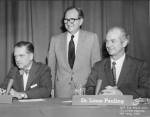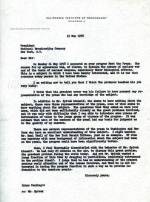|
The anti-Bomb movement appeared, in mid-1958, to be having some effect. Bomb-test
limits were being discussed at the highest levels of government, and the efforts of
Pauling, Russell, and others seemed to be giving legitimacy to those who wanted to
lessen the world’s load of fallout and decrease the threat of nuclear war. Pauling
by now was the most prominent peace activist in the US.
In May, he was invited to appear on Meet the Press, an important televised public affairs program, to explain his ideas. It turned into
a grilling by the four-member panel of journalists. Instead of a free platform to
make his case, Pauling was interrupted and asked about his Communist-front activities,
his support of the Rosenbergs, his carbon-14 pronouncements, and how he raised money
to distribute his petitions for peace. At the end of his half-hour on national television,
he felt he had gotten across few of his points about fallout and peace. He stalked
out the studio with Ava Helen by his side. They were both outraged. Slowly, however,
the tide of world opinion was shifting, and politicians began to sense the change.
Before the end of 1958, the US and the USSR had both stopped their nuclear tests,
putting in place a moratorium until talks could be held on an anti-testing agreement.
|
|
Click images to enlarge

Ned Brooks, Lawrence Spivak, and Linus Pauling, on the set of Meet the Press, NBC-television. May 11, 1958.

Letter from Linus Pauling to the President of National Broadcasting Corporation. May 15, 1958.
"When that program came to an end, Spivak took off down the hall, running as fast
as he could go, with my wife after him, waving her fists. I guess she had a hard
time restraining herself during the program. But he managed to escape."
|

